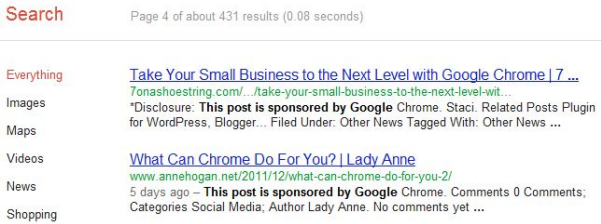The recent news that Google was inadvertently promoting it’s own browser Google Chrome to the top of Google rankings highlights concerning issues for software users, developers and the integrity of the blogosphere.
If you don’t know the story, Google were employing PR firm Unruly Media to promote Google’s own browser Chrome. Nothing wrong with that but unbeknown to Google, Unruly Media were paying bloggers to promote Google Chrome on blogs. To be fair to them, the posts did state “This post is sponsored by Google” in the search results but they helped rapidly improve Chrome’s search engine rankings which is strictly against Google’s code of ethics on paid links.

When search engine specialist sites SEO Book and Search Engine Land spotted what was going on, Google – to their credit – immediately took action and are now “punishing” the rankings of their own browser for the next 60 days.
The incident highlights three main points of concern.
1. Potential conflict of interest
This incident was largely out of Google’s control and to some extent, it has simply become a victim of it’s own success. Over the past ten years, it has gone from a simple search engine company to one that develops its own software. The battle for browser supremacy is so intense – and so incredibly lucrative to the winner – that it’s perfectly understandable that Google employed a PR firm to try and help boost Chrome rankings in its own search engine. The problem is exactly that however – that the battle is taking place in its own search engine and Google is caught between a rock and a hard place in how to conduct the battle. The company have to tread a very difficult line between promoting their own product Chrome, but not unfairly “favoring” it in Google rankings through various means.
2.Pitfalls of outsourcing marketing
The problem is that once Google has relinquished some marketing control over its products, it’s not as easy for it to check if is living up to its own code of ethics. Presumably, any company that enters into a marketing agreement with Google has to agree to abide by the company’s ethics code. However, it’s obviously not as easy for Google to keep tabs on absolutely every marketing campaign being used by PR firms it works with. The result may be an unfair playing field for developers trying to develop competing products and a bum deal for users who aren’t necessarily getting the best product for their needs when they perform a Google search.
3. Reliability of the blogosphere
When blogs first appeared, they were an outlet for people to express their feelings and thoughts on whatever issue took their fancy without any commercial influences and as such, have built up a highly trustworthy reputation. Today, blogs that look highly personalized may be heavily tainted by advertisers or corporate funding making it hard for users to know whether the information they are reading is trustworthy. The result is “personalized” blog posts that don’t reflect the user’s opinion – exactly what happened in this case as is amply highlighted here. This kind of problem has been brewing for some time and Frederic Filloux wrote one of the most thoughtful articles about it in “The Blogosphere’s Soft Corruption” following the TechCruch-Arrington saga.
Of course, you can always rely on us here at OnSoftware to bring you our honest opinions and thoughts on software, and check out our reviews of Google Chrome for Windows and Mac.
[Image courtesy of Search Engine Land]

